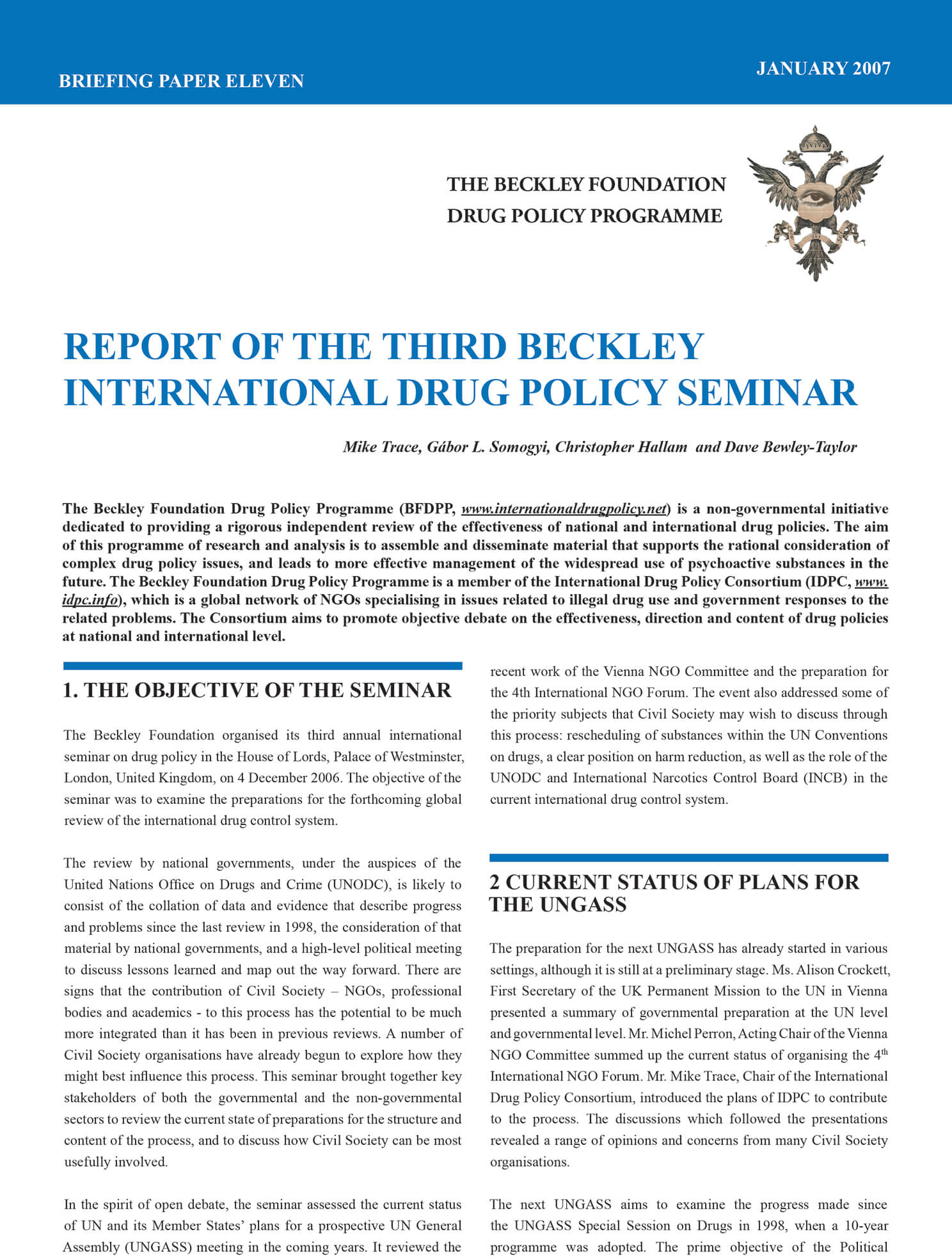
Sixth International Seminar of the series ‘Society and Drugs: A Rational Perspective’
House of Lords, Palace of Westminster London, 4 December 2006.
This seminar was arranged to review the preparations for the forthcoming global review of the international drug control system. The review by national governments, under the auspices of the United Nations Office on Drugs and Crime (UNODC), is likely to consist of the collation of data and evidence that describe progress and problems since the last review in 1998, the consideration of that material by national governments, and a high-level political meeting to discuss lessons learned and map out the way forward. There are signs that the contribution of Civil Society – NGOs, professional bodies and academics – to this process, has the potential to be much more integrated than it has been in previous reviews.
A number of Civil Society organisations have already begun to think how they might best influence this process. This seminar therefore aims to bring together the key individuals and agencies involved in these processes to review the current state of preparations for the structure and content of the process, and to discuss how Civil Society can be most usefully involved.
The objective of the seminar
The Beckley Foundation organised its sixths annual international seminar on drug policy in the House of Lords, Palace of Westminster, London, United Kingdom, on 4 December 2006. The objective of the seminar was to examine the preparations for the forthcoming global review of the international drug control system. The review by national governments, under the auspices of the United Nations Office on Drugs and Crime (UNODC), is likely to consist of the collation of data and evidence that describe progress and problems since the last review in 1998, the consideration of that material by national governments, and a high-level political meeting to discuss lessons learned and map out the way forward. There are signs that the contribution of Civil Society – NGOs, professional bodies and academics – to this process has the potential to be much more integrated than it has been in previous reviews. A number of Civil Society organisations have already begun to explore how they might best influence this process. This seminar brought together key stakeholders of both the governmental and the non-governmental sectors to review the current state of preparations for the structure and content of the process, and to discuss how Civil Society can be most usefully involved.
Authors: Mike Trace, Gábor L. Somogyi, Christopher Hallam and Dave Bewley-Taylor
Agenda
Morning Session
Welcome and Introduction – Amanda Feilding, Director, Beckley Foundation.
Current Status of Plans for The UNGASS – Alison Crockett, UK Mission to the UNODC.
The Work of the Vienna NGO Forum – Michel Perron, Chief Executive, Canadian Centre on Substance Abuse..
The Work of The International Drug Policy Consortium – Mike Trace, Chair, IDPC.
Presentations of other Ongoing Work and Final Discussion.
Afternoon Session
The second section of the seminar concentrated on some of the priority subjects that Civil Society may wish to address through this process:
New Approaches to Source Country Control – Fabrice Poithier, Senlis Council.
Rescheduling of Substances Within the Conventions – Martin Jelsma, Transnational Institute
Coca Leaf – Katy Swain, Release
A Clear Position on Harm Reduction – Daniel Wolfe, International Harm Reduction Development Programme.
The Role of the UNODC and INCB – Dave Bewley-Taylor, International Society for the Study of Drug Policy (ISSDP)
Discussion:
The final section of the seminar consisted of a structured but open discussion of ways in which Civil Society can work together to develop constructive proposals for the UNGASS process, and promote their ideas through the UN agencies, national governments and the media.
Podcast
- All
Links
- All
Support
- All
BIPRP
- All
Science Talk
- All
Amanda's Talks
- All
- Video Talk
- Featured
- 2016 Onwards
- 2011-2015
- 2010 and Earlier
- Science Talk
- Policy Talk
One-pager
- All
Music
- All
Amanda Feilding
- All
Events
- All
Highlights
- All
Psilocybin for Depression
- All
Current
- All
Category
- All
- Science
- Policy
- Culture
Substance/Method
- All
- Opiates
- Novel Psychoactive Substances
- Meditation
- Trepanation
- LSD
- Psilocybin
- Cannabis/cannabinoids
- Ayahuasca/DMT
- Coca/Cocaine
- MDMA
Collaboration
- All
- Beckley/Brazil Research Programme
- Beckley/Maastricht Research Programme
- Exeter University
- ICEERS
- Beckley/Sant Pau Research Programme
- University College London
- New York University
- Cardiff University
- Madrid Computense University
- Ethnobotanicals Research Programme
- Freiburg University
- Medical Office for Psychiatry and Psychotherapy, Solothurn
- Beckley/Sechenov Institute Research programme
- Hannover Medical School
- Beckley/Imperial Research Programme
- King's College London
- Johns Hopkins University
Clinical Application
- All
- Depression
- Addictions
- Anxiety
- Psychosis
- PTSD
- Cancer
- Cluster Headaches
Policy Focus
- All
- Policy Reports
- Advisory Work
- Seminar Series
- Advocacy/Campaigns
Type of publication
- All
- Original research
- Report
- Review
- Opinion/Correspondence
- Book
- Book chapter
- Conference abstract
- Petition/campaign
Search type
